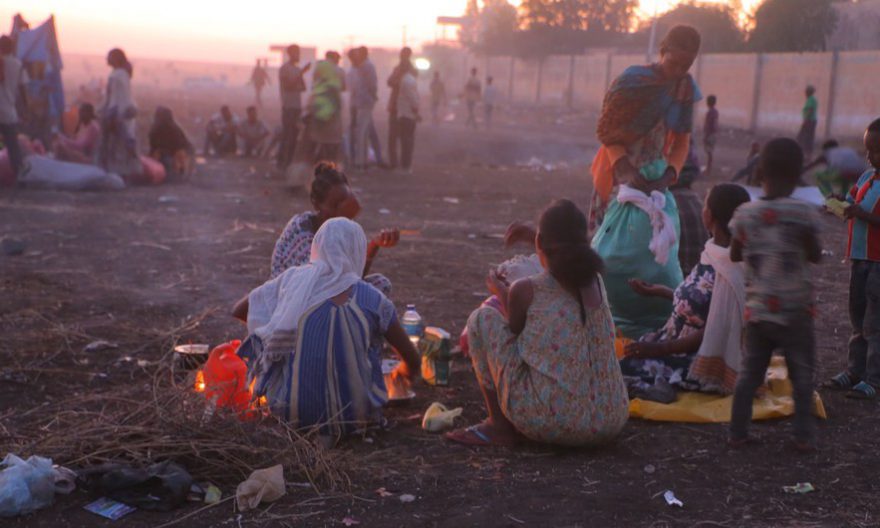
Part one
BY JEFF PEARCE
I’m just wondering…When Alex de Waal goes to parties with his TPLF buddies; do things get awkward because of all his aw-shucks gushing and practically humping their legs?
Here is Alex Mango on the late Seyoum Mesfin: “…Seyoum and his comrades, ‘revolutionary justice’ meant a transformation in the practice of killing your defeated enemies.” I somehow don’t think that memo reached the fifty (and still counting) interim administrators summarily murdered in Mekelle after the TPLF claimed victory with the unilateral ceasefire.
And here is the Director of the World Peace Foundation at Tufts University singing the praises of General Tsadkan Gebretensae, which the BBC chose to obliviously publish this month while ignoring it amounted to a puff piece profile of a terrorist leader. “His analysis, organizational skills and ability to win the trust of the fighters meant that by the late 1980s, he was one of its most respected operational commanders.” Later, we’re told by a former teacher that Tsadkan is “quiet, reflective, a listener, almost shy, open-minded — but of course there is steel inside.”
Yep, he’s that shy boy in high school you hope will ask you out and later sneak back into army barracks to commit treason. He’s ever so dreamy.
But of course, the star doesn’t make the rounds unless they’ve got a movie to shill, and the TPLF is all about the big show. Days later, Alex Mango defended pre-conditions for a ceasefire, making a desperate attempt to appear balanced with his calls for both sides to scale back the rhetoric.
Then Tsadkan pontificated to Elephant, claiming among other fabrications, that he only joined the TDF in November… despite his involvement in the TPLF’s efforts to raise a wider nation-wide “federalist force” (which included other entities like the OLF-Shene). And long before the November attacks and the planning and execution of the killing of thousands of troops across all outposts of the Northern Command.
Oh, and did you hear the one about the 8,000 prisoners of war?
Of course, now that we have the New York Times video of paraded soldiers plus less convincing and more ridiculous photos that have been clearly Photo shopped, some might be gullible enough to buy Tsadkan’s estimate.
Except there is no way that figure will tally against the number of troops killed, wounded, and even still within the ENDF after the November attack and which recently left Tigray. As I keep demanding: Name Them. Name every alleged “prisoner of war” you claim you’re holding, because the names will have to match the master roll of enlisted soldiers with Ethiopian federal authorities.
De Waal conveniently left out of his puff piece any excerpts from Tesfaye Gebreab’s memoir written on the Ethio-Eritrean war, which is far less flattering for his hero, like this one:
“General Tsadkan tried to call the meeting to order but he could not hide his emotions and broke down crying. He wept. All of the meeting participants cried with him. Infara was like a funeral home. Once he gained his composure, he tried to comfort the meeting participants. Everyone was crying. General Tsadkan said the following to the meeting participants, ‘I have led many battles in my career. I have fought in many wars. I have seen a lot. I have never experienced this kind of utter failure. It is bad.’”
One military strategist who was asked about this kind of behavior characterized it as “an utter failure of leadership and something which is totally uncharacteristic of skilled, charismatic and effective leaders.”
Yep. Big boy generals don’t cry, especially in front of their men.
What is the point of these self-promotions? As someone who’s worked in journalism and also in communications, I reflexively think of them as propaganda. Okay, sure, duh. But I’m also told that this is a classic insurgency tactic — and that the timing is important here.
I consulted a few experts, who not surprisingly given the amount of abuse anyone who speaks out against the TPLF receives, preferred to be quoted under pseudonyms.
Robert Franks (not his real name) says it’s no accident that Norway’s Kjetil Tronvoll and Alex Mango have left a long record of pro-TPLF “messaging” since the conflict began about eight months ago. Tronvoll, who once bragged about being Tigray’s only international election observer, now, boasts about connecting with TPLF officials and TDF senior officers daily over satellite phone. And as we now know, staff at World Food Programme is happy to loan the TPLF a satellite phone when they need it.
You’ll recall that de Waal’s best buddy “Yoohoo” Mulugeta, who keeps a villa in Tigray (despite claiming for the New York Times’ Declan Walsh that he was “just visiting” the region), inflated the number for Eritrean divisions in the region months ago.
Franks says that in terms of insurgency warfare, de Waal and Tronvoll represent the “auxiliary” of the insurgency effort. “The ‘auxiliary’ combines with the ‘guerillas’ and the ‘underground,’ in this case that ‘underground’ for our modern day is the Internet and the troll armies that work day and night, targeting policymakers, political representatives, the lobbyists who can influence the policy debate. They want to build the dominant narratives and keep pressure on the federal government. Okay, now all this, you understand, is well-trodden ground. You see this with, say, the Turkish government and you know, the Kurdish PKK, or the Azari government’s exchanges with Armenian rebels.”
Another expert, Dawit Tesfaye (not his real name), says “the TPLF propaganda troll army is not a new phenomenon and has been propping up in the TPLF’s authoritarian rule for years; especially since the 1-in-5 structure was developed. Anyone who veers from their warped and fabricated narrative will immediately receive emails in ranting pigeon English which are copied to all UN agencies, human rights agencies and the media in an effort to vilify and silence people. The international community is conveniently forgetting about years’ worth of this correspondence…”
And, says Franks, you can go further back. “Think of Mao Zedong’s concept of the People’s War. That was for its fight against the Japanese army in World War Two. You draw your opponent deep into the countryside, where you’re comfortable, and they aren’t. You bleed them dry with a mix of mobile and guerrilla warfare.”
According to another expert, Andrew Kakoiba (again, not his real name), if you want a successful insurgency, keep the spin cycle on. Lots of propaganda, which hits your target population and gets a reaction, which can prompt potential alliances and, oh yeah…blames your enemy for the destruction of the critical infrastructure the people rely on… Like maybe, (ahem!) a bridge.
In fact, why not blame your enemy for looting and damage to local services, like medical supplies and banking, transportation and education? On this last one, it really helps if the UN officials oblige you by helping to screw over the interim administration and block thousands of innocent kids from writing their exams).
A liberal mindset bristles at the thought of singling out any ethnic group as a potential “enemy” of the state. We don’t want to go there. And normally, we shouldn’t. Unfortunately, Nazis do tend to be white incels. And as Kakoiba point outs, “a Tigrayan middle class grew out of the TPLF providing its friends and relatives the access to all the opportunities Ethiopia had to offer — and to privileged lives overseas. No one should be surprised — no one — that such people infiltrate institutions where they can have influence and make decisions. They are catering only to themselves and their wealth, and care not about Tigrayan communities in Ethiopia.”
Kakoiba says look at the head of the World Health Organization, Tedros Adhanom, or senior management within UNHCR, UNICEF, USAID, Amnesty International and other organizations even managing to get into the White House itself.
“After TPLF split from the Prosperity Party in 2019, and while all Tigrayans in government were being called back to Mekelle, these individuals were being re-mobilized as ‘auxiliary’ and ‘underground’ to support the TPLF’s ongoing objective of recapturing power, and its sustained extraction of national resources.”
“The TPLF is very familiar with Mao Zedong’s insurgency concept,” says Franks. “They adopted the mainstay of it to front the overthrow of the Derg regime. To a large extent, the same commanders — I mean the few who are still alive — working in the Tigray conflict have relied on Mao’s doctrine to lead the current effort against the ENDF forces. These strategies and tactics, they’re dominated by what we call ‘Psy-Ops,’ Psychological operations and ‘information operations.’ As the TPLF lose on the conventional warfare front, these are the tools they will bolster to cling harder to their patronage-based alignment with the international community.”
Editor’s Note: The views entertained in this article do not necessarily reflect the stance of The Ethiopian Herald
THE ETHIOPIAN HERALD JULY 16/2021



